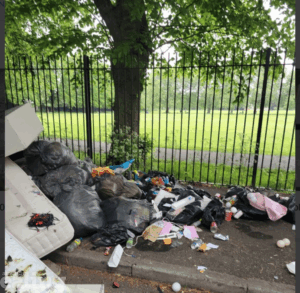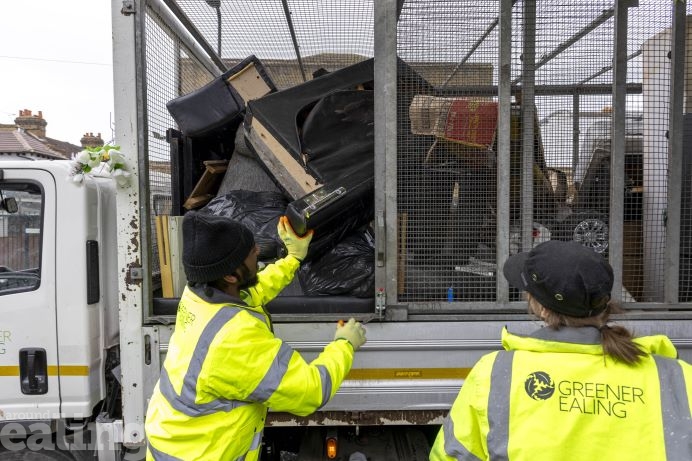Nearly 200 fines have been issued to fly-tippers since Ealing Council launched its campaign to take tougher action against people illegally dumping waste in the borough at the start of last month.
A total of 181 fines have been issued, which means the fly-tipper has to pay the newly introduced £1,000 fine or face court action.

This fly-tip on Southall Common was investigated, and the waste was found to belong to a resident in Feltham, who paid someone to take away their rubbish without checking for a valid waste carrier’s licence. Predictably, their waste was fly -tipped and the person received a fine for breaching their householder duty of care.
The council is taking a zero-tolerance approach to fly-tipping, handing out more fly-tipping fines than any other London borough, despite not being among the boroughs with the highest number of reported incidents.
Alongside issuing hefty fines, the council has also launched its awareness campaign ‘This is our home, not a tip’ which aims to increase awareness of what fly-tipping is, the impacts it has on both the council and the community, and how we can work together to stop fly-tipping.
Working together
To combat fly-tipping, we all have a role to play. The council is calling on residents to:
- use the council’s rubbish and recycling service from home on the correct collection day
- use Greenford Road Reuse and Recycling Centre, or the council’s bulky waste collection service
- report fly-tipping through the Love Clean Streets app or the council’s website.
Why is it such a problem?
This year to date, the council recorded 12,242 incidents of fly-tipping across the borough and spends around £3million per year on clearing and disposing of this waste. That is money that could be better spent. For example, it would be enough to pay for:
- 77 foster homes for children
- 32,000 potholes in our roads to be repaired
- more than 4,000 weeks of support at a day care centre for a vulnerable adult
Greener Ealing Ltd, the council’s rubbish and recycling contractor, works hard to collect as many fly-tips as possible, as quickly as it can. Currently, 98% of reported fly-tips are collected within 2 working days. But, this is time that could be better spent on keeping your streets clear of litter.
The council also has to spend time and money working hard to identify offenders. It uses evidence found in the dumped waste itself, CCTV footage and videos from witnesses to track down fly-tippers and issue fines.
Alongside the campaign, and fines, the council also works directly with residents – especially with the community group LAGER Can, which organises regular litter picks and reports fly-tips its members come across.
‘You will be caught, and you will be fined’
Council leader Peter Mason said: “Fly-tipping damages our environment and our sense of community. We are committed to taking strong action against criminal wasters and our enforcement teams are working hard to investigate illegal dumping across the borough. Fly-tippers, you will be caught, and you will be fined.”
Councillor Paul Driscoll, the council’s cabinet member for climate action, said: “Our community takes pride in its streets and green spaces, and fly-tipping undermines that pride. We’re asking everyone to work together – every report helps us track down offenders and keep our borough clean.”
Dealing with waste
You can report fly-tipping via the Love Clean Streets app or the council website.
Visit the council’s website to find out how to properly dispose of your waste, including details of the bulky waste collection service.





